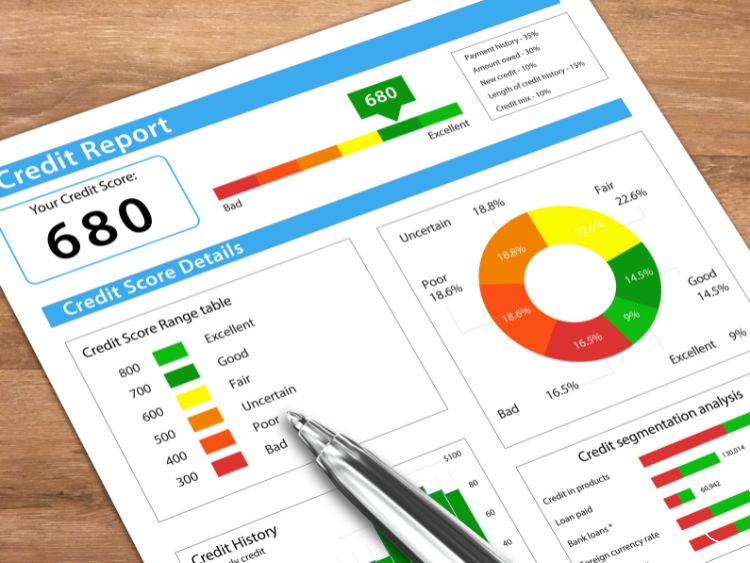A credit score is a three-digit number that reflects your creditworthiness, and a 680 credit score can significantly influence your financial journey. Understanding what a 680 credit score means, how it impacts your life, and how you can improve it is crucial for achieving your financial goals. Let’s dive into the ins and outs of having a 680 credit score.
Imagine this: you’re sitting in the bank, applying for a loan, and the banker pulls up your credit report. They see a 680 credit score staring back at them. What does this number mean for you? Is it good, bad, or just average? Understanding your credit score can feel like decoding a secret language, but it doesn’t have to be a mystery.
What is a 680 Credit Score?
A 680 credit score falls within the “good” range on the FICO score scale, which ranges from 300 to 850. While it’s not considered excellent, it’s above average and signifies to lenders that you’re a relatively low-risk borrower. This score can open doors to various credit opportunities, but there’s always room for improvement.
Why is Your Credit Score Important?
Your credit score is a key factor that lenders use to determine your creditworthiness. It affects your ability to get loans, credit cards, and even influences the interest rates you are offered. A higher score typically means better financial products and terms, while a lower score can limit your options and cost you more in interest.
Factors Affecting Your 680 Credit Score
Several factors contribute to your credit score, each playing a unique role in determining your overall creditworthiness. Here’s a breakdown of the key components:
- Payment History: This is the most significant factor, accounting for about 35% of your score. Timely payments boost your score, while late payments can drag it down.
- Credit Utilization: This ratio, which makes up about 30% of your score, measures how much of your available credit you’re using. Keeping it below 30% is ideal.
- Length of Credit History: Longer credit histories tend to improve your score. This factor accounts for 15% of your score.
- Credit Mix: Having a variety of credit types, such as credit cards, mortgages, and auto loans, can positively impact your score. This makes up 10% of your score.
- New Credit: Frequently opening new credit accounts can hurt your score, as it makes up the remaining 10%.
Benefits of Having a 680 Credit Score
While a 680 credit score isn’t perfect, it does offer several advantages:
- Better Loan Approval Odds: You are more likely to be approved for loans and credit cards than someone with a lower score.
- Lower Interest Rates: With a good credit score, you can qualify for lower interest rates on loans and credit cards, saving you money over time.
- Higher Credit Limits: Lenders may offer you higher credit limits, giving you more financial flexibility.
- Better Terms on Rentals and Utilities: Some landlords and utility companies check credit scores to determine your reliability. A 680 score can help you secure better terms.
Strategies to Improve Your 680 Credit Score
Improving your credit score takes time and effort, but the results are worth it. Here are some effective strategies:
Pay Your Bills on Time
This might seem like a no-brainer, but it’s the most critical factor in your credit score. Set up reminders or automatic payments to ensure you never miss a due date.
Reduce Your Credit Card Balances
High credit card balances can hurt your credit utilization ratio. Aim to pay down your balances and keep them low.
Avoid Opening New Credit Accounts Unnecessarily
Each time you apply for new credit, a hard inquiry is made on your credit report, which can temporarily lower your score. Only apply for new credit when absolutely necessary.
Monitor Your Credit Report
Regularly check your credit report for errors and dispute any inaccuracies. You can get a free copy of your credit report from each of the three major credit bureaus annually.
Keep Old Accounts Open
The length of your credit history is important, so keep old accounts open even if you don’t use them frequently. Closing them can shorten your credit history and lower your score.
FAQs
What Can I Do with a 680 Credit Score?
With a 680 credit score, you can qualify for a variety of financial products. You’ll likely get approved for credit cards, auto loans, and mortgages, albeit with slightly higher interest rates than those offered to individuals with excellent scores.
Can I Rent an Apartment with a 680 Credit Score?
Yes, a 680 credit score is generally sufficient to rent an apartment. However, landlords may consider other factors, such as your income and rental history, before making a final decision.
Will My 680 Credit Score Improve Over Time?
If you consistently practice good credit habits, such as paying your bills on time and reducing your debt, your credit score can improve over time.
Is a 680 Credit Score Good Enough for a Mortgage?
While a 680 credit score can qualify you for a mortgage, the terms may not be as favorable as those offered to individuals with higher scores. You may need to shop around to find the best rates and terms available to you.
How Long Does It Take to Improve a 680 Credit Score?
Improving your credit score is a gradual process. It can take several months to a few years to see significant improvements, depending on your starting point and the actions you take.
Summary
In conclusion, a 680 credit score is a solid starting point for achieving your financial goals. It reflects responsible credit behavior and opens up various opportunities, from better loan approval odds to lower interest rates. By understanding the factors that influence your score and implementing strategies to improve it, you can work towards an even higher credit score and enjoy the benefits that come with it.
Authoritative Links
- https://www.myfico.com/credit-education/whats-in-your-credit-score
- https://www.experian.com/blogs/news/2020/06/credit-scores-what-are-they/
- https://www.creditkarma.com/advice/i/credit-score-range
- https://www.consumerfinance.gov/ask-cfpb/what-is-a-credit-score-en-315/
Understanding your credit score and taking steps to improve it can have a lasting positive impact on your financial health. By following the advice in this guide, you’ll be well on your way to achieving a higher credit score and unlocking even more financial opportunities.


